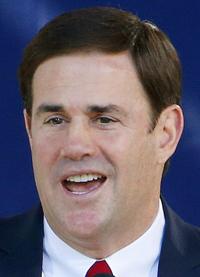State lawmakers are poised to give final approval Friday, Oct. 30, to a plan to put $3.5 billion into schools for the coming decade to settle a lawsuit.
Along party lines, the Republican-controlled House was moving late Thursday to approve the deal negotiated behind closed doors by legislative leadership, education groups and Gov. Doug Ducey.
A positive vote Friday by the Senate would send the plan to the governor for his anticipated signature. It also would set the stage for a special election in May for voter ratification.
An affirmative vote at that time would settle the lawsuit education groups filed five years ago after lawmakers ignored — illegally, according to a trial judge — a voter mandate to boost state aid annually to match inflation.
The package was presented by GOP leaders to their members as a done deal, with rank-and-file members told that any tinkering could dismantle the entire agreement to settle the lawsuit. Republicans held off attempts by House Democrats to make changes.
Representatives of education and child advocacy groups said Thursday that the take-it-or-leave-it nature of the deal left them no choice but to support the plan. They noted the package not only ends the lawsuit but gets needed cash to schools as soon as possible.
But Dana Naimark, executive director of the Children’s Action Alliance, said her support comes with a warning for legislators: “We’ll be watching.”
The state ended last budget year with $325 million left over and also has $460 million in a “rainy day” fund.
But lawmakers decided to tap the state land trust, which is earmarked for education.
Now Naimark wants to see what lawmakers do next year with all that cash.
“If you do more tax credits and more permanent tax cuts, you are giving away the money education will need for the future,” she said, saying those extra funds from the land trust dry up in 2025. She said voters, who get final say on the plan in May could reject it if they see lawmakers using the available money not for education but for a new round of corporate tax cuts.
There’s another issue: The package has an escape clause. Beginning in 2026, if education funding hits 49 percent of the total state budget, lawmakers actually could take money back from schools.
That’s not an issue now, with K-12 funding about 42 percent of the $9.1 billion spending plan.
The concern is that legislators could “game” the system: Education funding could hit that 49 percent mark not by giving schools new money but by cutting taxes and shrinking the rest of government. And that would force schools to give back cash.
There is a basis for concerns that the cash being held in reserve — and not being given to schools — could instead be used for tax cuts: Ducey was elected on a promise to propose reducing taxes every year “with the goal of pushing income tax rates as close to zero as possible.”
The governor said Thursday he isn’t thinking about tax cuts, at least not now.
“We’ve had six years of dramatic downturn,” he said.
He continued, “We’ve had six months of an improving situation. The most irresponsible thing we could do is to pass the punch bowl and start partying like it’s 2006.”
But the governor sidestepped questions about whether he will propose tax cuts when he gives his State of the State speech in January.
“I’m focused on the special session and what we want to get done here,” he said.
Ducey took his usual step of taking his sales pitch directly to lawmakers Thursday afternoon, going from office to office in the House and Senate to thank supporters and try to convince foes to change their minds. One of them was Sen. Steve Farley, D-Tucson.
“If you care about our kids, if you care about our future, if you want to get $3.5 billion in new money into K-12 education, all you have to do is vote ‘yes,’” he told Farley. “And we do it all without raising taxes.”
Farley told the governor he wants to resolve the lawsuit. But he objected to dipping into the education trust account so the state could use last year’s budget surplus for some other purpose. And he opposed the provision that would let lawmakers cut aid to schools after 2026.
“I have a kid in Tucson public schools,” he said. “‘And I don’t want my kid to get screwed over right now because we have a political purpose to be able to spend already dedicated education (trust fund) money on education purposes.”
“We’re not raiding anything,” Ducey said, saying the larger withdrawals are “a proper, better way in which to use the trust fund.” He said settling the lawsuit with trust dollars means keeping a “healthy balance” in the general fund and leaving the rainy day fund untouched.
“It’s good policy and it’s good politics,” Ducey said.
House Minority Leader Eric Meyer had a parallel concern. He worried that once lawmakers adopt this plan to settle the lawsuit they won’t do anything more to increase classroom funding, which on a per-student basis is the lowest of any state, or at least close to it.
“I’m jaded,” he said. “I’ve only been here when we’ve spent less” on education.




